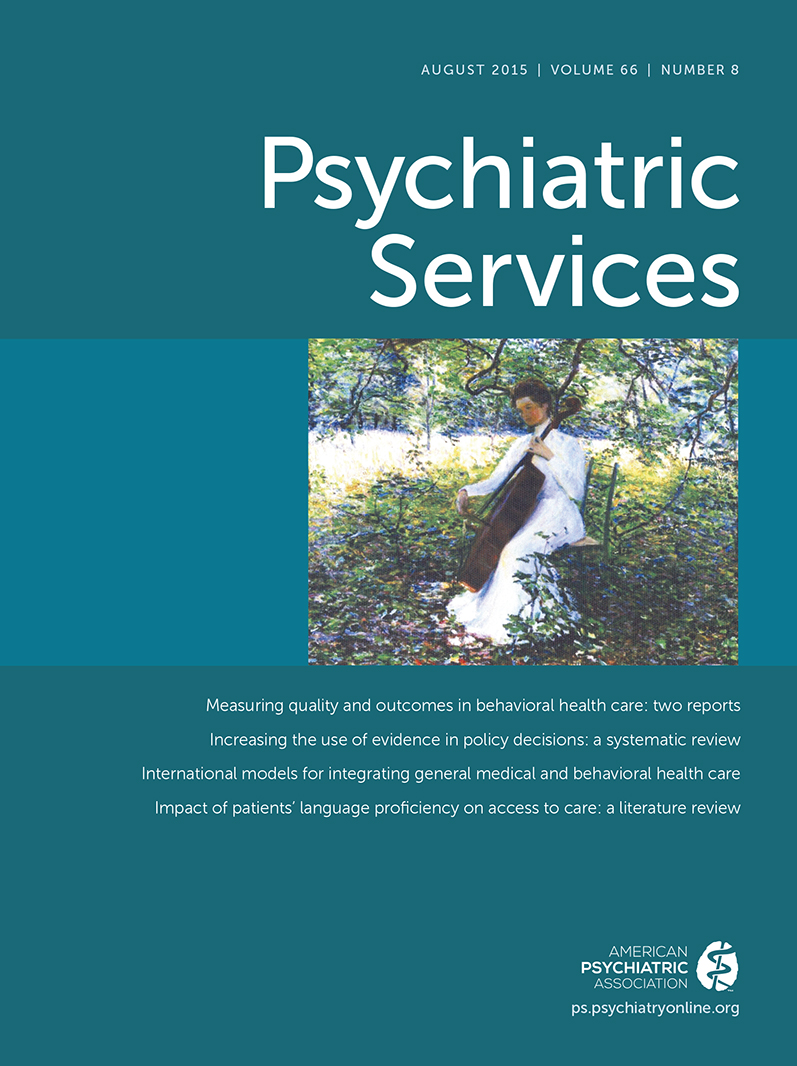This Month’s Highlights
Strategies to Increase Policy Makers’ Use of Evidence
Policy makers can play a substantial role in closing the evidence-practice gap—the gap between optimal mental health treatment and actual treatment. In this month’s lead article, Anna Williamson, B.Psych., Ph.D., and colleagues review literature describing strategies to increase the use of research evidence by mental health policy makers. The authors identified 55 articles that touched on use of evidence in mental health policy, which suggests a growing interest in this area. However, most research has focused on encouraging clinicians to adopt a practice—what the authors call “the second stage of implementation.” Several studies have reported promising findings about approaches that directly involve provider agencies and individual providers in the shift toward a culture of evidence-based practice. However, only nine intervention studies were identified that included a component aimed at increasing use of evidence in policy making. As the authors conclude, too little is known about how to ensure that policy makers pay attention to research evidence: “More systematic, scientifically rigorous attempts to increase the use of evidence in mental health policy—or even to document the process by which evidence is taken up in policy development—are needed if substantial, lasting change is to be made” (page Original article: 783).
Limited Language Proficiency, Limited Access
Limited proficiency in the language spoken by providers is likely to lead to treatment delays and inadequate care. Literature reviews in fields such as pediatrics and cancer screening have revealed a link between limited proficiency and poor access to care. To determine whether a similar link exists in mental health care, Ai Ohtani and colleagues undertook a review of mental health services research. The 18 articles that they identified were generally consistent in showing an association between insufficient language proficiency and underutilization of psychiatric services. However, they found no published data on the effects of linguistic interventions on access to mental health care among persons with limited language proficiency. “The lack of prospective interventional data,” they conclude, “clearly highlights the need for further investigations of the impact of language barriers on access to psychiatric care” (page Original article: 798).
Are Findings From RCTs Generalizable?
Patients who volunteer to participate in randomized controlled trials (RCTs) may have unique characteristics. In addition, RCTs often employ exclusion criteria that prevent enrollment by many patients seen in community settings. Thus it is natural to wonder whether RCT findings are generalizable to most patients. To address this question, Alisa B. Busch, M.D., M.S., and colleagues took a second look at data from the STEP-BD study (Systematic Treatment Enhancement Program for Bipolar Disorder), which provided a convenient way to compare RCT participants with a broader clinical population. STEP-BD was a large observational study that followed a group of clinically diverse patients in real-world settings. Running alongside the observational arm were two RCTs designed for participants who became acutely depressed and needed more intensive treatment. STEP-BD therapists offered participants an opportunity to participate in a parallel RCT. Dr. Busch and her colleagues found few clinical or demographic differences between patients who enrolled in an RCT and those who did not. In fact, the strongest determinant of RCT participation was site, which appeared to indicate that therapists at some sites were not referring patients to the RCTs—not that the patients themselves were not enrolling (page Original article: 817).
Measuring Performance and Quality in Behavioral Health Care
In the reformed health care system, all providers will need to demonstrate that the treatments they offer improve patients’ health and functioning. Until the behavioral health field has a set of widely accepted and useful measures, providers will not be able to fully demonstrate the value of behavioral health treatments. Milesh M. Patel, M.S., and colleagues examined the current state of behavioral health quality measures by determining how well existing measures align with priorities laid out by the National Behavioral Health Quality (NBHQ) Framework, which prioritizes prevention, treatment, and recovery goals. The authors found more than 500 measures that matched NBHQ priority areas, but only 10% were endorsed by the National Quality Forum, the gold standard for health care quality. “Future efforts should seek to fill gaps in measurement and to identify the most salient and strongest measures in each priority area,” the authors conclude (page Original article: 865). In the Open Forum, Sherry A. Glied, Ph.D., and colleagues issue a call to action for better measurement in behavioral health care. The authors argue that current efforts focus too heavily on structure and process and not enough on outcomes. Measures of functional outcomes are particularly needed (page Original article: 872).



